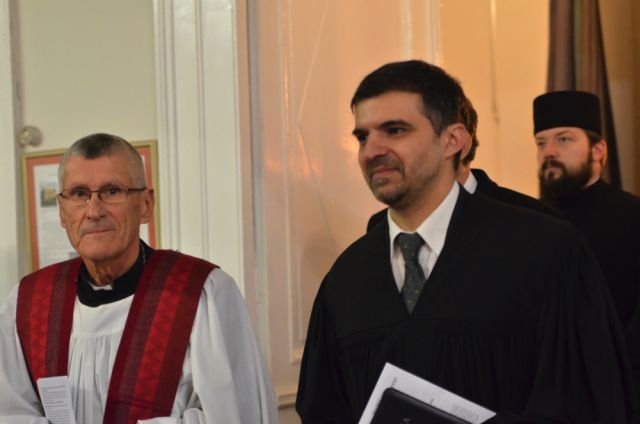Absztraktok 2022/03
Kustár György:
Gustaf Aulén és az engeszteléstan problémája
Gustaf Aulén A Christus Victor című művében az általa „keleti típusúnak” nevezett megváltástan rehabilitációjára törekszik. Ez az elmélet azt a problémát igyekszik kiküszöbölni, mely szerint Krisztus kereszthalála egyfajta elégtétel lenne – egyszerűen megfogalmazva: Isten a saját fia vérére szomjazna ahhoz, hogy megengesztelődjön. Aulén teológiájának és kategóriájának hatása megmutatkozik abban, hogy a Christus Victor motívum bevett megjelölőjévé válik a patrisztikus szerzők munkáiban végigkövethető jellemző egyik megváltás- képnek. Azonban az újabb teológiai-apologetikai kísérletek megmutatják a Christus Victor motívum gyengeségeit.
Gustaf Aulén, in his work titled Christus Victor, strives for the rehabilitation of the „Eastern type” of salvation-theory. This modell tries to solve the problem according to which the Death of Jesus is a penal substitution – to state it more simply: that God would thirst the blood of His own Son in order to be satisfied because of sin. Aulén’s theological influence is visible in that his „christus Victor” category for a certain salvation modell current in the patristic Fathers became commonplace. Yet the recent apologetical-theological endevoirs show that the Christus Victor motive has its backdrops in light of modern questions.
Legéndy Kristóf:
Hans-Georg Gadamer esztétikájának teológiai reflexiója
Tanulmányomban Gadamer esztétikai hermeneutikájának néhány főbb megállapítását teológiai nézőpontból vizsgálom. Gadamer kép és képmás értelmezése alapján a következőket állítom: 1) az a tény, hogy az istenkép nem érzékszervi tapasztalatból származik, egyáltalán nem zárja ki Isten valóságát; 2) az ember értékét az általa képviselt valóság adja, ezt nevezzük istenképiségnek; 3) az általános nyelvi tapasztalat rámutat arra, hogy a jelentés túlmutat a szavakon, mert a jelentés valami olyasmi, ami a szubjektummal történik. Összefoglalva: 1) az istenkép belső megtapasztalása 2) a valóság, amelyet az ember tetteivel és szavaival képvisel 3) a szavak jelentésének elkülönült valósága valószínűbbé teszi a dualista világnézetet (szellem-anyag, Isten-világ), mint a monista ateizmust.
In this paper I would like to expose some of the main statements of Gadamer’s aesthetic hermeneutics which are used to reach theological conclusion. Based on Gadamer’s interpretation of the ‘picture’ and the ‘copy’ I state the followings: 1) the fact that the picture of God does not come from a sensory experience does not exclude the reality of God at all; 2) the value of human beings is given by the reality it represents this is what we call image and likeness of God; 3) the general language experience points out that ‘meaning’ is beyond words, the ‘meaning’ is something what is happening with subjective. In summary 1) the inner experience of the image of God 2) the reality is represented by human beings and 3) the separate reality of the meaning of words makes the dualist worldview more likely than the monistic atheism.
Németh Balázs:
Az optimum fogalmának újszerű teológiai megközelítése
A tanulmány a matematikában és irányításelméletben gyakran használatos optimum fogalmát értelmezi válogatott bibliai-teológiai analógiákon keresztül. A megközelítés célja rámutatni arra, hogy ami a földi valóságban egymásnak ellentmondó feltétel, az a mennyei valóság figyelembe vételével összhangba hozható. Az újszerű megközelítésben bevezetésre kerülnek az eternális optimum, illetve a kiterjesztett valóság fogalmak, amelyek analógiái a 20. század teológiai gondolkozásában megtalálhatók. A tanulmány az optimum kérdését a 126. zsoltár témájából kiindulva a család és a hivatás összeegyeztethetőségének példáján keresztül vizsgálja.
In this paper the term of optimum in mathematics and control theory, through biblical and theological analogies is explained. The goal of the method is to illustrate that some contradictory conditions of earthy reality can be harmonized through the consideration of heavenly reality. During the development of the novel method the terms of eternal optimum and augmented realty are defined, whose analogies in the theological though of the 20. century can be found. The problem of finding optimum on the example of finding trade-off between family and profession is presented, which is motivated by the topic of Psalm 126.
Kormos Erik:
Péter látomása és az apostoli zsinat: reflexió egy hetednapi adventista tanítás alapjaira
A hetednapi adventista teológia, bár etikai jelleggel, de a zsidó teológiához hasonlóan a 3Mózes 11 alap- ján különbséget tesz a tiszta és a tisztátalan állatok, mint ételek között. Az alapvető különbség az, hogy az adventisták bizonyos újszövetségi szövegekre is hivatkoznak. Mivel úgy látják, hogy ez a rendelkezés nem szűnt meg, ez azt jelenti, hogy továbbra is a keresztény etika része maradt, mert „testünk a Szentlélek temploma” (1Kor 6,19). A protestáns teológia válasza erre az érvelésre az apostoli zsinat, amely „feloldja” a júdaista rendelkezéseket. Tanulmányomban az apostoli zsinat alapjait szeretném feltárni, és azt a kérdést feltenni, hogy egyáltalán lehetséges-e az adventista etikai érveket az apostoli zsinat eredményeivel szembe állítani. Ezzel célom, hogy érveljek a hetednapi adventista teológia biblikus jellege mellett, amely mind a protestáns, mind a római katolikus teológia mérlegén megállja a helyét, s ezt bizonyította is már számos alkalommal.
Seventh-day Adventist theology, though ethical in nature, makes an important distinction between clean and unclean food based on Leviticus 11, in a similar way to Jewish theology. The fundamental difference is that Adventists refer to the certain New Testament texts, too. Since they see the provisions as not having ceased, this means that they remain part of Christian ethics because „our bodies are the temple of the Holy Spirit” (1Cor 6:19). The Protestant theology’s response to this argument is the Apostolic Synod, which „dissolves” the Judaistic provisions. In my study, I want to explore the foundations of the Apostolic Synod and ask whether it is even possible to counter the Adventist ethical arguments with the results of the Apostolic Synod. In doing so, my aim is to argue for the biblical nature of Seventh-day Adventist theology, which has stood the test of time in the scales of both Protestant and Roman Catholic theology.























